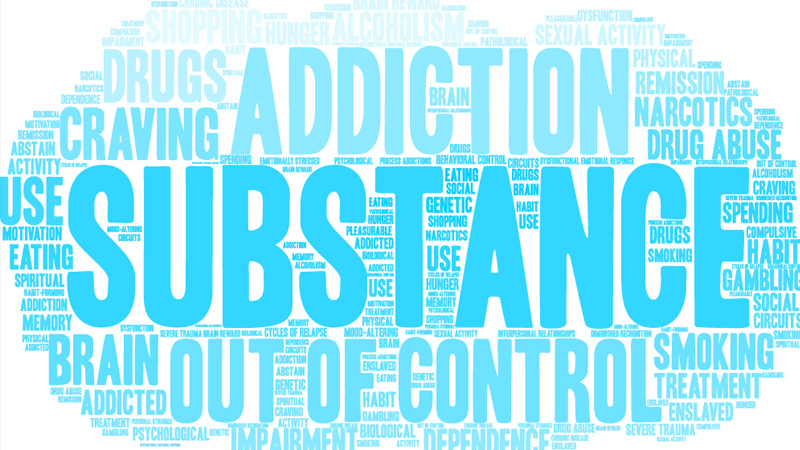Home > Behavioral Health > Substance Abuse and Drug Addiction
TEEN SUBSTANCE ABUSE AND DRUG ADDICTION
Drug addiction is described as the habitual abuse of a substance or substances without regard for the negative consequences that happen as a direct result of one’s use.
 General Information
General Information
Substance abuse is when a young person uses illegal drugs, or uses prescribed medications in a way other than directed by the prescribing medical health professional. In many cases, young people that abuse drugs are doing so as a form of self-medication. There are many substances that teenagers abuse, which can include, but are not limited to: marijuana, alcohol, stimulants, over-the-counter medications, opioids, and prescription medications. A teenager who abuses drugs does not necessarily inevitably develop addiction or drug dependence.
Though with the abuse of drugs or alcohol, addiction can be right around the corner, it is possible for an adolescent that is treated for his or her substance abuse to not reach the stage of true drug addiction. If, however, a young person does have a drug addiction, there are many treatment options. Each young person that is in treatment at Pacific Teen Treatment is highly intelligent, but struggles emotionally and has learned to rely on unhealthy and negative coping skills to manage their difficult emotions. Though substance abuse and drug addiction can have enormous consequences, adolescents who go through treatment can go on to live sober and joyful lives.
Signs & Symptoms
There are a number of signs and symptoms an adolescent may exhibit if he or she is struggling with substance abuse or addiction. Some behavioral examples can include any combination of the following:
• Changes in eating habits
• Changes in friendships
• Poor hygiene practices
• Avoiding previously enjoyable social activities
• Stealing
• Risk-taking behaviors
There are many components that can contribute to the development of a young person’s substance abuse or drug addiction. Every teenager is different and will have slightly differing signs and symptoms. If there is concern of the possibility of substance abuse or drug addiction with a teenager is it important to obtain the help and guidance of a qualified mental health professional.
 Treatment
TreatmentRegardless of whether a teen is abusing a substance or is addicted to a substance, his or her body will have become accustomed to functioning with the presence of the foreign substance. The first step in a young person’s recovery is to rid his or her body of the abused substance. The primary goal for a teen with substance abuse issues or drug addiction is abstinence.
Many young people struggling with substance abuse or drug addiction will also have underlying emotional issues that must be addressed as part of their recovery process. Pacific Teen Treatment uses a myriad of therapeutic modalities to create unique treatment plans for each of its residents. Depending on each individual, one’s treatment plan can be a blend of cognitive behavioral therapy (CBT), dialectical behavioral therapy (DBT), talk therapy, and/ or expressive arts therapy. Each of these types of therapies has unique benefits, and some will work better for certain teenagers than others.
Teenagers will work with our on-staff, board certified Child and Adolescent Psychiatrist as well as our other phenomenal resident therapeutic staff members to co-create a productive and nuanced treatment plan. We also encourage our residents to participate in various relaxation methods, such as meditation or yoga to help learn to manage stress in a healthy way.
In order to stop the pattern of young people turning to drugs and alcohol to self-medicate, we use various therapies to teach healthy coping skills. In addition to the therapeutic methods utilized, we incorporate healthy eating habits, proper sleeping patterns, regular exercise, and relaxation methods as essential components to our program. Modeling healthy habits and allowing our residents a safe environment to break unhealthy patterns and learn to develop and practice healthy and sustainable routines creates a solid foundation for recovery.
Further Information
Seeking help is never easy, but you are not alone! If you or someone you know is in need of mental health treatment, we strongly encourage you to reach out for help as quickly as possible. It is not uncommon for many mental health difficulties to impact a person’s life, long term. Seeking support at the beginning of one’s journey can put the individual in the best position to learn how to manage themselves in a healthy way so they can go on to live happy and fulfilling lives.
Our knowledgeable admissions team can be reached 24/7 at info@pacificrtc.com or call: (800) 531-5769
We are available to answer any questions you may have regarding mental health treatment and our residential program, anytime. Contact us today using the form to the right.


 General Information
General Information